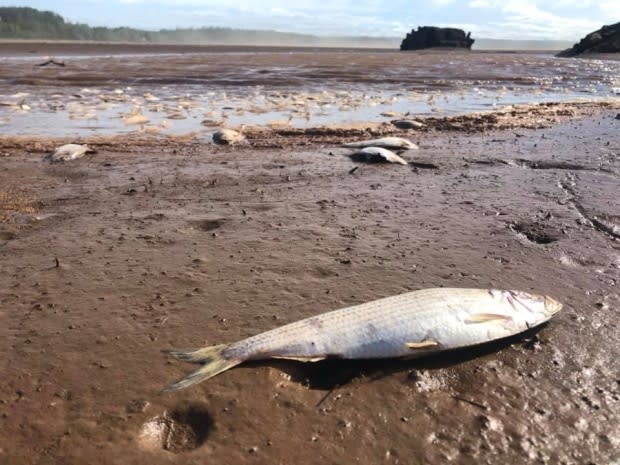Mi'kmaw community seeks temporary halt on N.S. highway project, renewed negotiations with province
Sipekne'katik First Nation in Nova Scotia is testing out a new Indigenous rights-focused consultation process by asking the provincial government to temporarily halt a major highway project and to clearly define any impact on the rights of the Mi'kmaq.
The $390 million project, which will twin a 9.5 kilometre section of Highway 101 near Windsor, N.S., was approved in June 2017. The work will include widening a causeway across the Avon River, and the construction of a controlled tidal exchange.
Since the work began, there has been opposition from multiple Mi'kmaw communities and environmental groups concerning the restriction of water flow and fish passage under the worksite.
The sudden death of fish in the man-made lake along the causeway in May 2020 led the First Nation to intervene, according to a news release issued Tuesday by Sipekne'katik.

"Where there is a fish kill there is an immediate concern of the impact to those species and the impact to our collective rights," said Sipekne'katik Chief Michael Sack in the release.
"This should be immediately addressed as an ongoing environmental emergency."
The release calls on the province to temporarily restore the regular flow of water to allow fish to pass through, and to renew discussions with the band and "ensure rights-based consultations are conducted outside of environmental processes."
'New way of doing business'
The new consultation process follows a March 2020 Nova Scotia Supreme Court decision that found the province did not consult adequately with Sipekne'katik about a natural gas storage project along the Shubenacadie River, 61 kilometres east of the Windsor causeway.
Following the decision, the province is obliged to "a new way of doing business" with the Mi'kmaq, said Sipekne'katik consultation lead Cheryl Maloney.
"Under the current environmental approach to consultations in this country, [First Nations] were just seen as mere stakeholders," she said.
"What the courts are now saying is [governments and corporations] can talk to us about technical, environmental issues with other stakeholders, but that's not addressing [First Nations] rights, and that's not an open and respectful relationship."
In his decision, Justice Frank Edwards said "there is room for improvement on both sides" of the consultations, but that the province must determine the strength of the band's claim that the rights of its members will be affected, beyond environmental issues.

In an emailed statement, a provincial spokesperson said the province will respond to Sipekne'katik "through the continuing consultation process."
"We will continue to consult with Sipekne'katik on all project-related future decisions that could adversely impact the community's Aboriginal and treaty rights, including, where appropriate, assertions of Aboriginal title," the statement reads.
Current process a 'math game'
Maloney equates the current consultation process to a "math game," in which the federal and provincial governments tally the number of meetings and communications shared with First Nations.
Having more meetings doesn't mean the consultation is meaningful and the rights of the First Nation are being taken seriously, Maloney said.
"For the Mi'kmaq in this case, we have a strong established treaty right. If we're defending our rights in court, then we're in an adversarial position where the province or the Crown is against Indigenous Peoples," she said.
"[The consultation] has to be meaningful. The honour of the Crown has to be kept, and in order to do that you have to take an honest look at what the strength of the Aboriginal claim is."

Sipekne'katik typically carries out consultation negotiations apart from the 12 other Mi'kmaw communities in the province, 11 of which are represented by Kwilmu'kw Maw-klusuaqn Negotiation Office, a negotiating body under the Assembly of Nova Scotia Mi'kmaw Chiefs.
Sipekne'katik's new consultation process, Maloney said, was based on feedback from its community members gathered in 2016 and 2017. An information package will be provided to community members by September, Maloney said, and after an 18-month review period, the final process will go back to the community for ratification.
"This is how we want to be engaged. It's rooted in Canadian law, Indigenous law and Mi'kmaw law. So it's really going to be hard for [the province] to say, well no we don't want to operate that way," Maloney said.
In the case of the Windsor Causeway, the negotiations will be rooted in environmental protection, she said, but further cases may involve Mi'kmaq title to any land, water or resources in the area of mainland Nova Scotia known as the ancestral, territorial Mi'kmaw district of Sipekne'katik.


